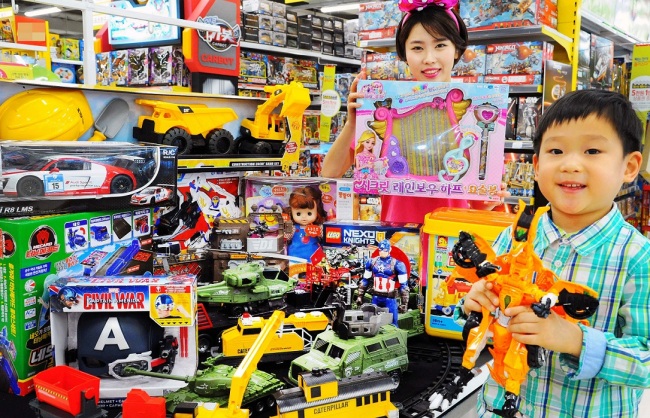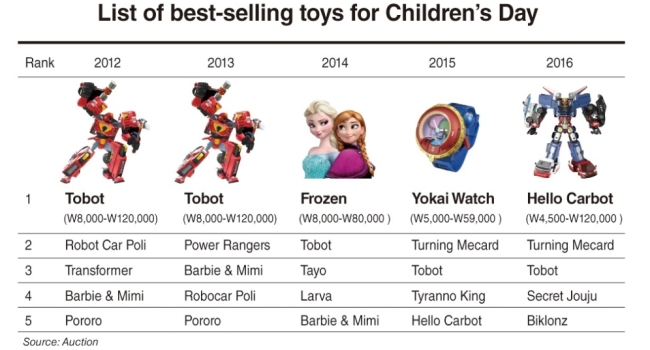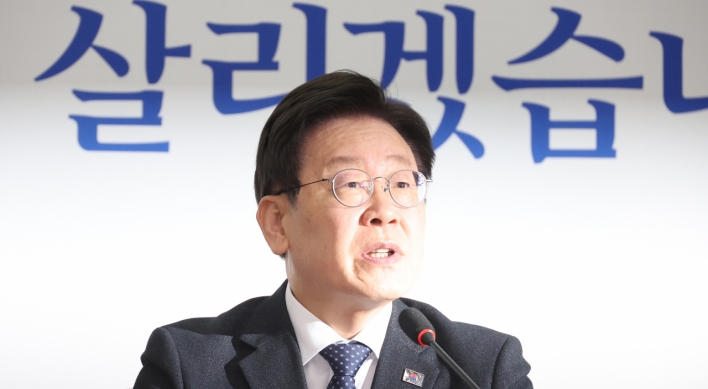[WEEKENDER] Parental competition, anxiety over future drive kids market
By Korea HeraldPublished : April 29, 2016 - 16:56
For Kim Young-eun, a 39-year-old office worker in Seoul, her priority this week was to secure a box from the latest Lego series “Nexo Knights” for her 7-year-old son as a present for Children’s Day.
“It’s around 140,000-150,000 won,” she said, adding that it’s almost her duty as a parent not to disappoint her kid, who often compares his presents with those of classmates.
“The problem is that we have too many occasions to celebrate. … Apart from Children’s Day, we also have Christmas, birthdays, Chuseok and Lunar New Year’s holidays. They occur almost every two months.”
“It’s around 140,000-150,000 won,” she said, adding that it’s almost her duty as a parent not to disappoint her kid, who often compares his presents with those of classmates.
“The problem is that we have too many occasions to celebrate. … Apart from Children’s Day, we also have Christmas, birthdays, Chuseok and Lunar New Year’s holidays. They occur almost every two months.”

On an ordinary day, it is still costly to keep a child looking decent, feed him organic food and have him attend various classes -- including math, Korean and English. If you are surrounded by people who do all this, it is extremely hard to be the odd one out.
Kim regularly meets a group of mothers to share information on a wide range of products and programs, to make each of their kids “a leader” in their classes. The standard 7-year-old leader would look good, be tall and study well, she said.
Kim is one of many Korean parents eager to spend their hard-earned money to satisfy the needs of their children and raise them to become an above-average person, as a future elite school graduate with a decent job. And it all starts at an early age.
From name-brand clothes to organic food and tailored education tools for toddlers, the market for kids has grown fast and wide to the point of being overrated.
The size of the baby market -- for basic needs such as diapers, toys and baby gears -- is estimated at 1.7 trillion won ($1.38 billion). Industry insiders say the kids market may be the only one that will not be affected by a slowing economy.
According to Auction, an online shopping site, sales of kid’s furniture jumped by 23 percent from Jan. 1- April 21 this year compared to the same time period last year. Popular items were premium products made out of eco-friendly materials.
CJmall, another online shopping service, said the sales of toys increased by 15 percent in April compared to March. Each customer spent an average of 170,700 won, a 2.3-fold increase from 72,200 won in 2013.

Companies and private education institutes have also jumped into the fray to cash in on the competition and anxiety of the parents.
The state-run Korea Institute for Child Care and Education’s February report shows that the size of private education for children aged five and younger reached 3.23 trillion won in 2015, up 22.2 percent from the year before.
“No parent wants to force their kids to do something they don’t want to. But in reality, it is not easy to let that expectation go,” said Oh Soo-hyun, the mother of a 5-year-old boy.
“After all, Korea is a competitive society, and admission to an elite school is a ticket for a promising future. No parent would miss that opportunity, no matter the cost.”
By Cho Chung-un (christory@heraldcorp.com)
-
Articles by Korea Herald




![[Herald Interview] 'Amid aging population, Korea to invite more young professionals from overseas'](http://res.heraldm.com/phpwas/restmb_idxmake.php?idx=644&simg=/content/image/2024/04/24/20240424050844_0.jpg&u=20240424200058)






![[Hello India] Hyundai Motor vows to boost 'clean mobility' in India](http://res.heraldm.com/phpwas/restmb_idxmake.php?idx=644&simg=/content/image/2024/04/25/20240425050672_0.jpg&u=)







![[Today’s K-pop] NewJeans' single teasers release amid intrigue](http://res.heraldm.com/phpwas/restmb_idxmake.php?idx=642&simg=/content/image/2024/04/26/20240426050575_0.jpg&u=)